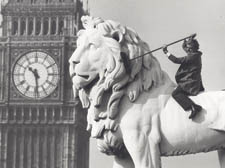|
|
 |
| |
 Illtyd as GLC deputy leader cleaning up London Illtyd as GLC deputy leader cleaning up London |
Yes, Prime Minister
As the cash-for-honours inquiry winds up with no charges,Illtyd Harrington reveals how a prime minister once offered him a peerage – and explains why he’s still plain ‘Mr’
IT was April 1975. A snowy day. I waited in the central lobby of the House of Commons to be taken to lunch. My host was Prime Minister Harold Wilson. He came smiling towards me under the gaze of the curious, the astonished and the spiteful as we went in the members’ dining room.
He smiled mischievously: “There must be someone outrageous here today and it can’t be you, Illtyd. It must be me.”
For more than a year we had spoken about such matters as urban decay and ideas for renewal, as well as the increasing problem of local government finance. As deputy leader of the Greater London Council (GLC) and the senior chairman of that authority I sat at the heart of British local government.
Wilson had been encouraged to listen to me by his political secretary Marcia Williams, later Lady Falkender. She was what has become known in the Downing Street of today as the Gatekeeper. From my observation she was more a splendid goalkeeper in that house of paranoia.
Wilson – doomed in 18 months to become a victim of Alzheimer’s – still had his phenomenal memory and rapid reactions.
Towards the end of our lunch he broached what he wanted me to do.
First: could I persuade my friend Charles Wintour, editor of the Evening Standard, to launch a campaign for commemorating the Queen’s Jubilee in 1977?
Second: could I talk to Sir Eric Millar of Peachy Properties and Sir Don Gosling, of NCP, about a proposed central London site for a conference centre suitable for the Commonwealth Prime Ministers’ conference two years ahead in 1977?
Third: he warned me of a dangerous move by the Treasury and the International Monetary Fund to curb local government expenditure. In a determined tone, he suggested that pre-emptive restraint by the GLC in its expenditure might spike their guns and not allow us to be their fall-guy.
“There’s just one more thing.” Those china blue eyes looked directly at me and he said: “I need you in the Lords. Nobody in there at the moment has the weight of your local government experience.”
I said: “Thank you, and my answer is yes.”
It was a heady moment. On the way out he bade a peremptory good day to the left-wing minister Eric Heffer who had opposed Wilson over the Common Market.
Wickedly, and without a hint of blasphemy, he muttered to me: “He has abandoned Marxism for the Anglican church. He tells people that, like Jesus, he is a carpenter too. This, I am sorry to say, has given him a confused sense of identity.”
Events moved fast and I discharged the first of his requests. I wrote the front page of the Evening Standard. It was called: “We want a Jubilee.”
I worked to fulfil the Prime Minister’s conference centre request and persuaded a reluctant GLC to exercise financial restraint. (This was a mistake as we found out later, because the Treasury figures had been manicured if not falsified.)
Shortly afterwards, my home was burgled with high speed and precision. MI5, it seems, was on the rampage – or at least those elements of MI5 that believed that there was a Communist cell at the heart of Wilson’s kitchen cabinet.
A few years later, the renegade MI5 agent Peter Wright wrote in his his book Spycatcher, which Mrs Thatcher tried to ban: “We burgled our way across London – on the assumption that there was a Communist cell in Downing Street.”
I can say with assurance that I was not part of this fantasy conspiracy. To make it look like an ordinary break-in, the intruders made away with an obsolete Betamax video set – something that any self-respecting professional burglar would have known to be worthless.
Years later, Merlyn Rees, Callaghan’s Home Secretary and a friend of members of my family, told them: “MI5 was out of control.”
As Wilson became conscious of impending illness, the much vaunted “Lavender List” of resignation honours was compiled – so called because it was drawn up on pink paper believed to have been Marcia Falkender’s.
But when the list was published, my name (mysteriously) was not on it. I had done Wilson’s bidding and my friendship and affection for the influential Marcia had held good, apart from occasional tempestuous offsets. At any rate, she has insisted that the Lavender List was all her boss’s work. So what was the explanation?
A year or so ago Lord Bernard Donoghue, Wilson’s policy adviser, published his Downing Street diaries and revealed it was the obnoxious Labour chief whip Bob Mellish who had pressed to have me omitted, presumably on MI5 advice. (The security services had my CV in a bright red folder.)
The abrasive Mellish – an old adversary of mine – had frequently sailed close to the wind and was disgracefully a welcome visitor to Franco’s fascist Spain.
So I remain plain Mr Harrington, unsullied by charges of peculation and exonerated by my own conscience and continuing loyalty to my friend who sat near the highest office of state. Wilson, after all, had held it all together and I did enjoy that unique lunch in a public place, where disloyalty lurked behind subsidised plates of smoked salmon.
And by the way, I never received a visit or had my collar felt by the equivalent of Yates of the Yard. And I certainly had no cash to pay for an honour even if it had been required. |
 |
|
| |
|
 |
|
 Illtyd as GLC deputy leader cleaning up London
Illtyd as GLC deputy leader cleaning up London